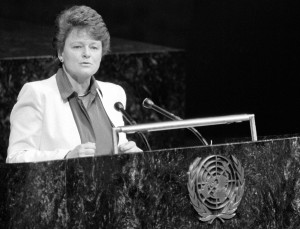
Gro Harlem Brundtland, Prime Minister of Norway, addressing the UN General Assembly on Environment and Development, 19 October 1987. Source: UN Photo
The term sustainability and phrase sustainable development were popularised with the publication of Our Common Future, a report released by the World Commission on Environment and Development in 1987. Also known as the Brundlandt report, it introduced the widely quoted definition of sustainable development: “development which meets the needs of the present without compromising the ability of future generations to meet their own needs.”
The report argued that economic development and social equity were necessary in order to protect the environmental and that the goals of economic well-being, equity and environmental protection could be reconciled if social and environmental considerations were systematically integrated into all decisions affecting the economy. Since the publication of the Brundtland report sustainable development has been widely accepted as a guiding principle, and yet the concept remains elusive and implementation has proven difficult. This is caused by the fact that economic development, social equity, and environmental protection are contradictory areas that are difficult to be reconciled. As a result the report is seen by many as a landmark in environmental politics and diplomacy while others decry it as a missed opportunity.
In a newly published book entitled Defining Sustainable Development for Our Common Future. A History of the World Commission on Environment and Development Iris Borowy critically examines the history and impact of the Brundtland Commission. The book explores how the work of the Commission brought together contradictory expectations and world views in the concept of sustainable development as a way to reconcile these profound differences.
This episode of Exploring Environmental History examines these contradictions as well as the historical context of sustainability with the author of Defining Sustainable Development, Iris Borowy. She is a researcher at the Institute of History, Theory and Ethics in Medicine of RWTH Aachen University, in Germany.
Sites and literature mentioned
Defining Sustainable Development for Our Common Future. A History of the World Commission on Environment and Development, Routledge, 2013.
Original report of the World Commission on Environment and Development: Our Common Future, from un-documents.net
Christian Pfister, “The “1950s Syndrome” and the Transition from a Slow-Going to a Rapid Loss of Global Sustainability”, In: Frank Uekoetter (ed.), The Turning Points of Environmental History (Pittsburgh, 2010), pp. 90-118. Download paper.
Music credits
“Where You Are Now” by Zapac, available from ccMixter
“Piano 8 by AT” by Martijn de Boer (NiGiD), available from ccMixter
“Life Isn’t Everything” by Hans Atom, available from ccMixter

Recent Comments